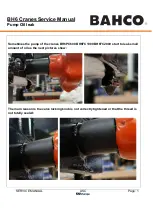
Chapter 7 - Display and controls in stand-alone m ode
PROFIBUS Tester BC-700-PB - User Manual
39
7.6
Organize and store test results
PROFIBUS Tester 5 comprises three predefined network folders: a default network folder
and two empty folders.
A network folder is a directory containing all the test results assigned to a network. The
name of the network folder is the same as the network name displayed during the data
import into the PC.
The default network is provided for spontaneous tests and is a fixed component of the
project management and cannot be deleted. However, you can rename and edit the
default network and start testing using this network. If you are deleting all networks,
automatically the default network including a default segment and a default test location
will be generated in the network folder.
A network in PROFIBUS Tester 5 comprises one or more segments, and one or more
test locations. A minimum network configuration (default network) comprises one
segment (default segment) and one test location (default test location).
The test location has a major influence on the test result, particularly when testing signal
quality, using the oscilloscope function or using the cable test function. To store all test
results within a network in the PROFIBUS Tester 5, you have to set the radio button to the
corresponding network in the networks function (see also
).
Figure 29: Select Network – the radio button is set to "engine production"
Test results in stand-alone mode are stored under the specified test location in the
network you have defined as the storage location. Thus, test results will be organized and
stored in PROFIBUS Tester 5 according to their test location. Refer to the figure below to
see an example network which could be organized as follows in PROFIBUS Tester 5
(recommendation):
1.
Use the
Networks/ select network
function and select an empty network folder.
Enter the network name (e.g. "engine production").
2.
Use the
Edit network
sub-function and rename the default segment (e.g. to
"heating") and add two new segments (e.g. "foundry" and "conveyor belt").
3.
Use the
Test locations
function and generate six test locations.
32
















































